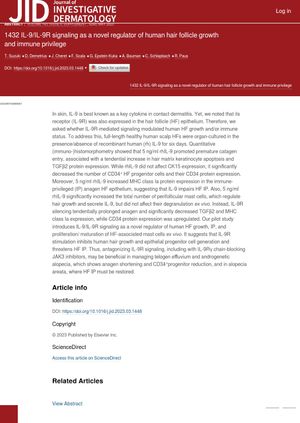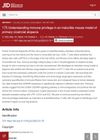IL-9/IL-9R Signaling as a Novel Regulator of Human Hair Follicle Growth and Immune Privilege
April 2023
in “
Journal of Investigative Dermatology
”

TLDR IL-9/IL-9R signaling can negatively affect human hair growth and may be a target for treating hair loss conditions.
The study introduces IL-9/IL-9R signaling as a new regulator of human hair follicle (HF) growth, immune privilege (IP), and proliferation/maturation of HF-associated mast cells. The research was conducted on full-length healthy human scalp HFs, cultured with or without recombinant human IL-9 for six days. The results showed that 5 ng/ml of IL-9 promoted premature catagen entry, increased hair matrix keratinocyte apoptosis, TGFβ2 protein expression, and MHC class Ia protein expression in the IP anagen HF epithelium. It also decreased the number of CD34+ HF progenitor cells and their CD34 protein expression. The study suggests that IL-9R stimulation inhibits human hair growth and epithelial progenitor cell generation and threatens HF IP. Therefore, blocking IL-9R signaling may be beneficial in managing hair loss conditions like telogen effluvium and androgenetic alopecia, which show anagen shortening and CD34+progenitor reduction, and in alopecia areata, where HF IP must be restored.
